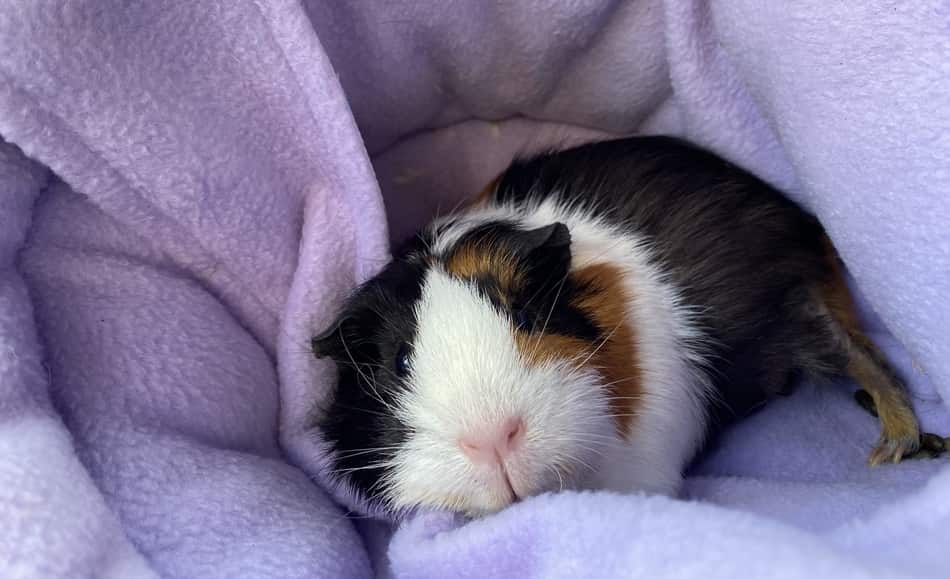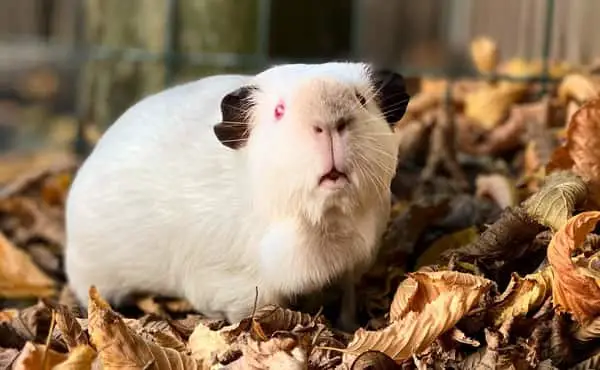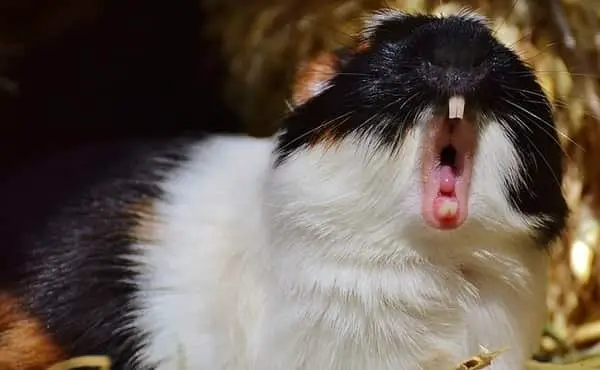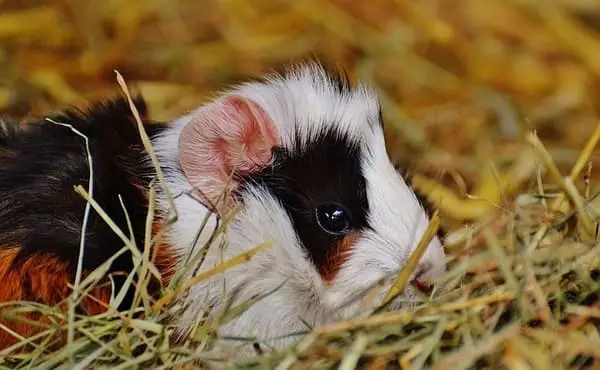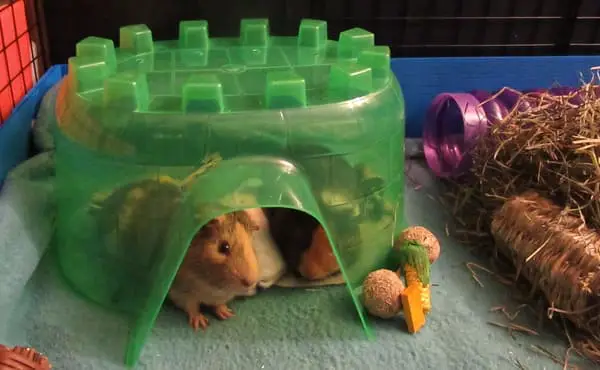Squeaking, along with body language, is the primary way guinea pigs communicate with humans and other guinea pigs. But why do guinea pigs squeak in the first place? Each type of noise a guinea pig makes means something different, and every time your guinea talks to you, it’s telling you something important!
So, why doesn’t my guinea pig squeak anymore? First, they may have an injury or sickness, such as a throat infection, that makes it harder for them to use their vocal cords. They may also be less excited for their food, therefore squeaking less when it’s time to be fed. Lastly, their environment and stress may be playing a factor as well.
In this article, we’ll break down each of these causes. But before we dive into the possible reasons your guinea pig is silent, let’s talk about the different noises guinea pigs make and what they mean, so you can tell what’s happening with your cavy based on which sound they are no longer making.
What Does It Mean When Guinea Pigs Squeak?
We’re going to discuss the different noises guinea pigs make, as well as their meanings, to help you determine what’s going on with your pet based on which noise they’ve stopped making. If they’re completely silent and no longer make any sound at all, feel free to jump to the section titled “Injury or Sickness.”
Why Guineas Squeak
Guinea pigs squeak to communicate with their fellow cavies and with their humans. It’s their main way of talking and they use it to tell you what they need, as well as what they like and don’t like. There are nine distinct sounds a guinea pig will make, each for a different reason. We’ll start with wheeking.
Wheeking
This is the sound guinea pigs make the most. It’s the noise that sounds most like a squeak. When a guinea pig is excited–especially about their food–they will wheek. Sometimes they do this for attention, too.
Purring
Guinea pigs purr in a couple different scenarios. When they’re relaxed and happy, they’ll purr deep, whereas when they’re tense and irritated, their purr will sound higher. If the guinea pig’s purr is short, it may mean they’re scared.
Rumbling
Rumbling sounds deeper than purring, and guinea pigs use it to attract a mate.
Teeth Chattering
If your guinea pig is chattering its teeth, they are angry. This sound serves as a warning to let guineas and humans around them know to stay away.
Hissing
This sounds identical to a cat’s hiss and, just like teeth chattering, is meant to show anger and annoyance.
Cooing
Guinea pigs coo when they’re trying to reassure and comfort. This sound is almost exclusively made by mother guineas.
Shrieking
This noise is extremely loud and also qualifies as a squeak. A shrieking guinea pig is scared or hurt. Make sure to check on them as fast as you can.
Whining
This noise communicates agitation, or that your guinea pig doesn’t like something.
Chirping
The reason for this noise is largely unknown, but it sounds just like a bird’s chirp and isn’t very common.
Injury or Sickness
So now that you know all the different sounds your guinea pig makes and why, we can move on to why your guinea pig is quiet. The first reason we’ll talk about is injury or sickness.
Any and all injury or sickness may cause your guinea pig to stop making noise, so make sure you take your guinea pig to the vet if they are displaying any behavioral changes, but lymphadenitis (inflamed lymph nodes) and vocal cord damage specifically are the most likely cause of silence in your guinea pig.
Lymphadenitis
Lymph nodes are part of the immune system. They filter pathogens and disease out of the blood and are located in the head, neck, and throughout the rest of the body. When they get infected, the guinea pig’s immune system takes a hit, and especially if the infection is in the neck, it could affect the throat.
Symptoms
While an infection in the lymph nodes is internal and can be hard to detect, there are a few signs you can look out for. If any of these things are happening in your cavy, rush to the vet.
- Swollen lymph nodes
- Tilting head
- Eye and sinus inflammation
- Internal organ inflammation
- Difficulty breathing
- Pale or blue-ish skin
- Bloody urine
Causes
Bacteria is what causes lymphadenitis, and that bacteria can come from a multitude of places. Most likely, your guinea pig got sick due to inflammatory food, dirty bedding, or overgrown teeth and being unable to close their mouth. If other guinea pigs are sick, it can easily spread as well.
This sickness can easily cause vocal damage if the lymph nodes in the neck are infected, which may be the cause of your guinea pig’s lack of noise.
Treatments
The safest treatment for lymphadenitis is antibiotics. If needed, your veterinarian can drain abscesses. Sometimes abscesses break on their own, as well, but take caution around any abscesses because if the pus enters the bloodstream, your pig may become even sicker.
Contact your veterinarian and consult them to know your best options.
Vocal Cord Damage
The next probable cause of your guinea pig becoming noiseless is vocal cord damage. This could be from lymphadenitis or even from an injury to your guinea pig’s throat. Vocal cord damage causes the sounds your guinea pig makes to sound strained, or even to stop. There’s not much you can do to resolve this, but you can remove the vocal cords if they seem to be causing pain.
Food Boredom
Most guinea pigs wheek when they are excited about their food. Wheeking is the loud squeaking most associated with guinea pigs, but if they aren’t excited about the food they’re receiving, they may stop making the noise. If your guinea pig only wheeked before and now doesn’t at all, it’s very possible they are just bored with their food.
How to Help
To help your guinea pig stay excited about their food, offer them some variety. You can change the kind of hay or pellets you’re feeding, as well as give them fresh fruits and vegetables. They sell treats for guinea pigs at pet stores, too. Switching foods may help.
Environment
A guinea pig’s environment makes a big difference in how they’re feeling, which plays a role in how much noise they make. If their environment isn’t good for them, and if they’re not feeling their best, your guinea pig might be quiet.
Temperature
Make sure your guinea pig’s room and cage are not too cold or too hot. Heat exhaustion and excessive cold are likely to keep your guinea from talking. The best temperature for them is 65- and 75-degrees fahrenheit.
Noise
Noise also makes a difference in your guinea pig’s noise patterns. If there are loud noises going on around your guinea pig frequently, chances are, they’re getting more and more stressed. When stress increases, it changes behavior in guinea pigs.
Decreasing Stress
Classic signs of guinea pig stress include hiding, sleeping a lot, and general nervousness. They may also be more irritable and aggressive, and they might stop eating regularly.
Although your guinea pig may be quiet due to rising stress, there are ways to calm them and bring their noise back. They are:
- Making sure the cages are big enough for each guinea pig
- Giving your pigs places to hide
- Minimizing loud noises
- Bringing new things into the environment slowly
- Moving slow, not suddenly
- Speaking to them calmly when you’re with them
- Give them time when they’re anxious
- Keep other pets away from them
- Give them stress-relieving toys, such as chew toys, tunnels, and toys involving treats
- Cover their cage if they’re scared, or when you expect they will be scared
- Play relaxing music for them
Make sure you’re patient during this process. Guinea pigs can sometimes get scared easily and will take a moment to calm down entirely. They need your help and love as they calm down again.
Conclusion
Overall, there are a few reasons your guinea pig isn’t squeaking. Only lymphadenitis is a good cause for immediate alarm. The other reasons, although they still matter just as much, are not life threatening and most likely don’t require an immediate trip to the vet.
Most likely, with a few small lifestyle changes–including changing their food and treats, decreasing their stress, and changing factors in their environment, your guinea pig will be back to their normal, vocal self!

